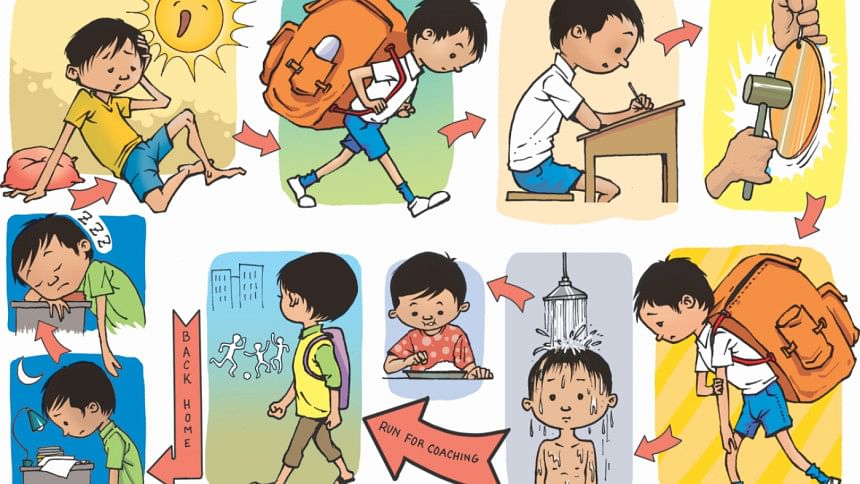Kids caught up in chores

As the clock strikes 7:00am, Samira is woken up by her mother. Fighting the sleepiness that still overwhelms her, the fourth grader freshens herself up and puts on her school uniform.
After breakfast, the 10-year-old sets out for school with her bag stuffed full of books and writing pads. From their Kakrail home, her mother hurries Samira to school at Nayapaltan on a rickshaw. Her school begins at 7:30am.
"Sometimes she can't take her breakfast due to the rush,” says her mother, Rubina Amin.
Samira, sixth in her class, returns home around noon, takes her bath and lunch and gets some rest. She then runs for her coaching class that begins at 3:00pm. After she returns home around 4:30pm, her Arabic teacher comes for an hour-long lesson.
She then takes one hour's break when she watches TV or plays in the balcony. Afterwards, she does her homework and after that watches TV for a while. After dinner, she hits the bed around midnight.
"Except for Fridays and Saturdays, this is what she does every day. Sometimes she gets bored and badgers me to take her outside. But I can't, because there is no playground or open space in the neighbourhood," said Rubina.
But it's not only about Samira. Almost all schoolkids in general and those living in metropolitan cities in particular are caught up in such a monotonous routine. They are being robbed of a childhood, free and playful, thanks to the relentless pressure of class, study, exam, private tuition and coaching.
They are growing up with little or no outdoor activities. Their only recreational activities are: some playtime in the balcony, car park or roof or computer games or simply watching TV.
Though the pressure eases a little during Ramadan because of vacation, many schools give a huge volume of assignments to be done at home. And once the schools open, there will be the same gruelling schedules.
EXTRA MEASURES
Tashin, a class-five student of Faizur Rahman Ideal Institute in Khilgaon, wakes up an hour before Samira.
After studying for an hour, he heads for his coaching at 8:30am. From there, he goes to school that begins at 12:15noon.
Tashin returns home after attending classes till 5:30pm. He then has a little free time when he runs around on the rooftop or plays computer or mobile games.
There is no playground or open space in his heavily congested neighbourhood either.
After the “playtime,” his private tutor comes in the evening.
"He will take this year's primary terminal examination. That's why we take some extra measures," said his father Ekram Ahmed.
His tuition ends between 8:00pm and 8:30pm. After homework and dinner, he goes to bed like Samira and million others, only to get up next morning for the day's battle.
“I shuttle between home and school, that's my day. Can't go anywhere. Sometimes, I don't like it,” Tahsin told The Daily Star.
ALL FOR GOOD GRADES!
For young kids, there is no shortage of textbooks these days. Then almost every year new things get added to the syllabus. So the children need to study more, guardians said.
Shabnur Sultana said her second-grader son had eight textbooks. "That's why I need to stick to him all the time. Otherwise, he does not want to study."
In many schools, teachers do not give the lessons they ought to give in classrooms, which is why guardians arrange for private tutors and coaching for their kids, parents say.
"Every parent wants their kids to do well in exams and get good grades, and there is nothing wrong in that," she said.
"We try to give our best so that my son competes well," said Amena Islam, whose son is a sixth-grader at Monipur High School in Mirpur.
Some guardians alleged that most of the schools in Dhaka compelled students to attend coaching before and after classes, eating up a considerable time of their day.
"If I didn't send my kid for the coaching, the teachers would treat him badly in the class and give poor grades,” said one guardian, asking not to be named.
AN UNHEALTHY COMPETITION
Educationists and psychologists say many parents consider good results as the key to success and that is why they want to keep their children busy in studies throughout the day.
"It's an unhealthy competition that the parents are in just to make sure their kids get good results," said Rasheda K Choudhury, executive director of Campaign for Popular Education.
And this trend is spreading like a disease, she added.
"The children, particularly those studying in mainstream schools in cities, are having extreme pressure of studies, coaching and private tuitions,” said Rasheda, also primary education adviser of a former caretaker government.
"Guardians think standing first in the class or getting GPA-5 is the main goal in life ... We are not letting the children grow up as children. I am not sure whether parents realise the consequences," she added.
Prof Dr Mohit Kamal, head of psychotherapy at the National Institute of Mental Health, said it seemed the guardians were running faster than the kids themselves.
"Parents do everything thinking about the wellbeing of their kids, but in doing so they are putting tremendous pressure on them. The children do not get any spare time due to the pressure of studies," he said.
THE PERIL
Such a hectic daily life poses a big threat to children, hindering their physical and mental development.
"Any kind of pressure on children hinders their mental growth," said Prof Mohit Kamal.
Citing his experience, he said many parents take to him their children with problems caused by pressure.
Because students spend nearly all their time studying, they have little time to discover or pursue their own passions, or develop physical and social skills.
Also, children have no time for socialisation, sports and cultural events, said Dr Muntasir Maruf of the National Institute of Mental Health.
"When these children grow up, they run the risk of becoming socially isolated and may suffer from social phobia. As a result, they cannot cope well in social gatherings,” he added.
To him, the current education system lacks diversity. And the boring routine may lead children to depression, which in turn can cause behavioural changes.
Parents should understand that merit is spontaneous, he said, adding, "For their mental growth, guardians have to encourage their kids, listen to them and value their opinions."

 For all latest news, follow The Daily Star's Google News channel.
For all latest news, follow The Daily Star's Google News channel. 








Comments